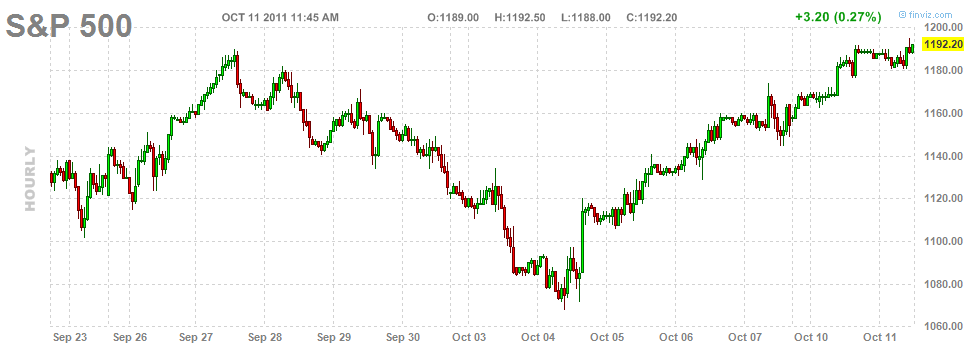Just because the media creates a product does not mean you have to consume it. Previously I have mentioned the dangers of watching CNBC for investors and traders alike. The same could be said of a staple of financial journalism the daily market report.
At its worse the daily market chatter coming from the financial media, per Josh Brown, can seem like a parody of itself. At its best it pulls together hanging threads, like Joe Weisenthal does on a regular basis, together into what seems more like a whole cloth. For example what kind of narrative makes the market action below make sense?

Felix Salmon is skeptical that market reporting can be done all that well, even when there is a story to be told. He writes:
Market reports should not be an everyday staple of news coverage. Sometimes, occasionally, there are stories in the markets. And then those stories can be reported. But when there aren’t any stories, there’s no point in trying to invent them. And so the daily report — let alone the intra-day report — is at heart a stupid piece of journalism. Some are better than others, to be sure. But none of them are any good.
Mark Gongloff is sympathetic to Salmon’s argument that at its worse market reporting can be misleading. However he recognizes that to get to a broader narrative you have to start somewhere. He writes:
But small market habits and tics like that — intraday herd mentality, late-day ETF rebalancing, automated trading programs — do help tell the broader story of what happens in a market day, and each of those days build up to the broader trends that affect lives and fortunes.
There’s a lot going on, and a lot of it is interesting, and some of it is actually important. Somebody needs to be truly paying attention to it.
The question is what investors should be doing. Most investors should have a time horizon longer than a market trading day. Important stories that affect how the market operate will bubble up into the financial blogosphere. Investors should focus on those things they can control. The market and its intra-day reaction to news is definitely not one of those things. In the end the problem is that an excess of noise makes it difficult to discern what is truly important from what is trivial. Maybe Vitaliy Katsenelson says it best:
You may think you’re able to filter the noise. You cannot; it overwhelms you. So don’t fight the noise — block it.
Items mentioned above:
Turn off CNBC. (Abnormal Returns)
The absurdity of market reports. (The Reformed Broker)
The hot new theory of the economy. (Money Game)
Market reports are hurting America. (Felix Salmon)
If stock market reporting is bad, that’s just because we are doing it wrong. (Mark Gongloff)
A few simple rules for money managers. (Institutional Investor)
The post that kicked off this discussion. (CJR)
Noise induced hearing loss. (Wikipedia)








